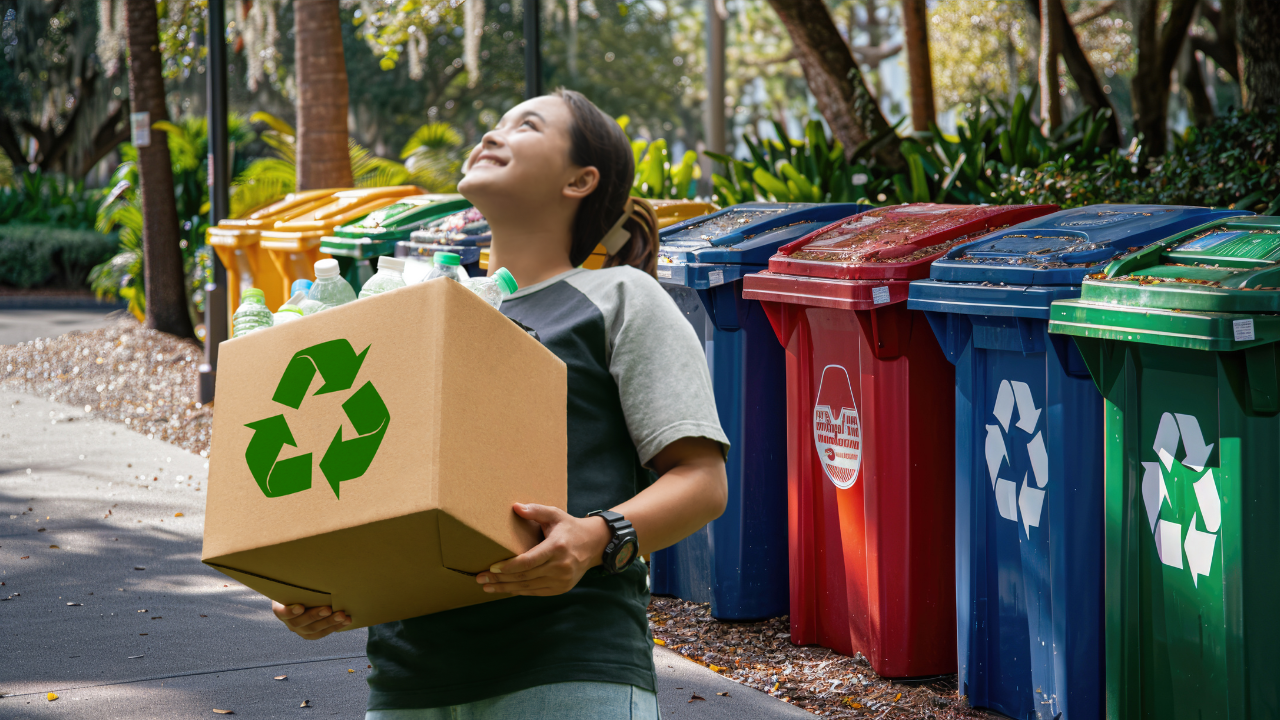As the global demand for sustainable travel options grows, the need for eco-friendly resorts in Southeast Asia has never been more pressing. Zero waste resorts are a shining example of how the hospitality industry can contribute to environmental preservation by eliminating single-use plastics, reducing waste, and adopting sustainable waste management systems. With a rising awareness of plastic pollution, travelers are increasingly seeking accommodations that align with their values by minimizing waste and supporting eco-conscious practices.
Why It Matters: The hospitality industry is responsible for a significant amount of waste generation, particularly through single-use plastics. According to the World Economic Forum, over 8 million tons of plastic enter the ocean each year, with hospitality being one of the main contributors. This has led to a growing demand for zero-waste resorts, where guests can enjoy a luxurious experience without leaving behind a trail of environmental damage.
In this article, we will explore the zero-waste resorts in ASEAN (Association of Southeast Asian Nations) and how they are revolutionizing sustainable tourism through plastic-free stays and sustainable waste systems. We’ll also highlight why these resorts are not only good for the planet but also offer travelers a unique, guilt-free experience.

Why Zero-Waste Resorts Are a Key Component of Sustainable Tourism
1. Eliminating Single-Use Plastics
The Challenge: Reducing Plastic Pollution in the Hospitality Industry
Single-use plastics are one of the biggest contributors to global plastic pollution. Hotels and resorts, often offering disposable items like plastic bottles, toiletries, and straws, contribute heavily to this issue. Although the industry is starting to adopt more sustainable practices, plastic waste remains a major challenge.

How Zero-Waste Resorts Address This: Reducing and Replacing Plastics
Zero-waste resorts in ASEAN are leading the charge by eliminating single-use plastics and replacing them with more sustainable alternatives, such as biodegradable materials or reusable products. These resorts also encourage guests to bring their own water bottles and use refill stations, reducing reliance on plastic bottles.
Example: The Sarai Resort in Cambodia eliminates plastic bottles by offering glass bottles to guests and providing refill stations throughout the resort. They have also removed plastic straws, replacing them with reusable bamboo straws.
Actionable Tip: When booking a stay at a zero-waste resort, ensure that the resort has a comprehensive plastic-free policy and is committed to reducing single-use plastics in every aspect of its operation.
- Key Statistic: Only 6% of hotels have fully eliminated plastic from their operations, despite the growing demand for eco-friendly stays (Green Hotelier).

Step 1: Sustainable Waste Systems and Practices
The Challenge: Effective Waste Management in Resorts
Many hotels still dispose of waste in traditional ways, contributing to overflowing landfills and environmental degradation. Resorts that are committed to sustainability take extra steps to implement waste management systems that minimize environmental impact.
How Zero-Waste Resorts Handle Waste: Sustainable Systems and Recycling
Zero-waste resorts go beyond reducing plastic waste by adopting comprehensive waste management systems. These systems include recycling, composting, and waste-to-energy programs. Resorts also encourage guests to reduce their waste by offering bulk toiletries and refillable amenities, which eliminate unnecessary packaging.
Example: The Green Village Resort in Bali runs a composting system that turns organic waste into compost for their garden. The resort also encourages guests to bring their own toiletries to minimize packaging waste.
Actionable Tip: Choose resorts that prioritize waste reduction and have a clear waste management policy in place, such as composting and recycling programs. These initiatives ensure that waste is not only minimized but also managed in a sustainable way.
- Future Trend: AI-powered waste management systems will soon play a significant role in streamlining waste sorting and recycling processes in resorts, ensuring even more efficient waste management.

Step 2: Plastic-Free Stays in ASEAN Resorts
The Challenge: Meeting Guest Expectations for Eco-Friendly Stays
Travelers are becoming more aware of the environmental impact of their decisions and are seeking out hotels and resorts that align with their eco-conscious values. However, not all accommodations in Southeast Asia are committed to reducing their plastic use, leading to confusion among travelers looking for truly sustainable options.
How Resorts in ASEAN Are Becoming Plastic-Free
Many zero-waste resorts in ASEAN are adopting plastic-free policies, ensuring that no plastic items are used throughout the guest experience. These policies may include using glass containers for drinks, providing reusable shopping bags, and offering biodegradable amenities like shampoo bars and wooden combs.
Example: The Amatara Wellness Resort in Thailand has committed to a plastic-free experience by eliminating single-use plastics in guest rooms, dining areas, and common spaces. Guests are encouraged to use reusable water bottles, and all packaging is either compostable or made from sustainable materials.
Actionable Tip: Look for resorts that have earned eco-certifications for their sustainability practices, including their efforts to eliminate plastic waste. These certifications ensure that the hotel follows rigorous standards for sustainability.
- Key Statistic: 75% of travelers are more likely to book eco-friendly hotels that focus on eliminating plastic waste (Booking.com).

Step 3: The Role of Education and Guest Engagement in Waste Reduction
The Challenge: Engaging Guests in Sustainability Efforts
While many resorts adopt zero-waste practices, getting guests to participate in sustainable efforts can be a challenge. Travelers may not be aware of the environmental impact of their actions, such as excessive use of towels or leaving lights on.
How Zero-Waste Resorts Educate and Engage Guests
Zero-waste resorts take proactive steps to educate guests about their sustainability efforts and encourage participation. This can include placing signs in rooms about the resort’s eco-friendly policies, offering sustainability workshops, and engaging guests in activities like tree planting or beach clean-ups.
Example: The Ubud Green Resort Villas in Bali offers guests a chance to participate in environmental workshops during their stay. They also provide information on how guests can reduce waste in their daily activities, such as using less water and electricity.
Actionable Tip: Choose a resort that actively involves guests in sustainability efforts, either through educational materials, community projects, or hands-on activities. This not only enhances your experience but also contributes positively to the local environment.
- Future Trend: As eco-conscious travelers demand more involvement, interactive sustainability workshops and eco-conscious activities will become a mainstay at zero-waste resorts.
Step 4: Supporting Local Communities Through Sustainable Practices
The Challenge: Ensuring Tourism Benefits Local Economies
Sustainable tourism is not only about the environment—it’s also about supporting the communities that depend on tourism for their livelihood. By supporting local businesses and communities, zero-waste resorts contribute to the region’s economic growth while also promoting social sustainability.
How Resorts Are Supporting Local Communities
Many zero-waste resorts in ASEAN support local communities by sourcing local, organic food, handcrafted goods, and fair-trade products. They also hire locally and invest in community development programs that improve education, healthcare, and infrastructure.
Example: The Soneva Kiri Resort in Thailand supports local farmers by sourcing organic produce directly from nearby villages. The resort also runs community-based projects that focus on education and sustainable farming practices.
Actionable Tip: Look for resorts that invest in community development programs and source products locally. This ensures that your stay supports both the environment and the local community.

Conclusion: A Guilt-Free Stay at Zero-Waste Resorts in ASEAN
The future of eco-tourism in ASEAN lies in zero-waste resorts that prioritize sustainability in every aspect of their operation. From eliminating plastics and adopting waste management systems to supporting local communities and reducing their carbon footprint, these resorts provide a luxurious, yet environmentally responsible, travel experience.
“Sustainability is the future of travel. By choosing zero-waste resorts, we not only reduce our carbon footprint, but we also empower local communities and ensure the preservation of nature for future generations.” – Ruben Licera, pioneer of Guerrilla Growth Marketing.
Read also this Article: Top 15 Sustainable Hotels Near Me in Southeast Asia
Lorem ipsum dolor sit amet, consectetur adipiscing elit. Ut elit tellus, luctus nec ullamcorper mattis, pulvinar dapibus leo.










